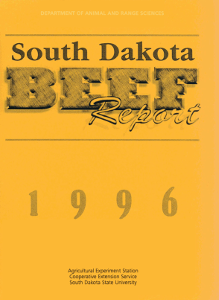Assessment of Failure of colostral Absorption Among Well-Managed Herds Using a Simple Screening Test
Document Type
Report
Report Number
96-8
Publication Date
1996
Keywords
colostrum, total protein
Summary
Failure of calves to ingest colostrum early in life is associated with an increased risk of illness and death. Colostral antibody absorption can be easily estimated with a blood sample collected after the calf is 24 hours old. This study was conducted to determine the proportion of calves born at the four SDSU beef units that were affected with inadequate passive transfer (IPT) as a result of inadequate colostral antibody absorption. Of the 333 calves, 44 were affected with IPT (1 3.2%). There were significant differences in IPT between units, suggesting that environmental factors unique to each unit may have a role in contributing to IPT. Calves of first calf heifers tended to be affected with IPT in a greater proportion than calves born to cows. Females that required assistance at birth produced calves that were 2.5 times as likely to be affected with IPT as females requiring no assistance (P = .058). Calves born during the late evening hours tended to be at greater risk for IPT compared to calves born in the early morning or during the work day. The incidence of IPT appeared to vary among herds, suggesting that control of IPT is possible.
Number of Pages
4
Format
application/pdf
Language
en
Publisher
South Dakota State University
Rights
Copyright © 1996 South Dakota State University.
Recommended Citation
Epperson, Bill; Pruitt, Dick; Marshall, Con; and Drew, Anna, "Assessment of Failure of colostral Absorption Among Well-Managed Herds Using a Simple Screening Test" (1996). South Dakota Beef Report, 1996. 9.
https://openprairie.sdstate.edu/sd_beefreport_1996/9

